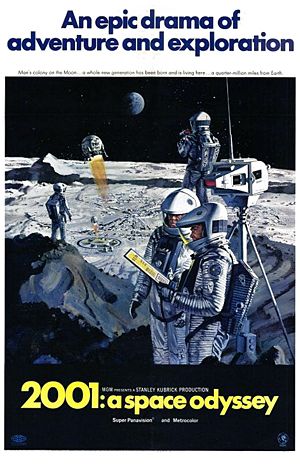Review by James Bratone: 2001 A Space Odyssey, film by Stanley Kubrick

I use this review to introduce my partner in this blog, great friend, James Bratone. He's brilliant and a born critic. Jim went to film school at the University of Texas, which has one of the best departments in the county. He won awards for his student films, especially a sand animation film called "quicksand."He's a fine artist and studied for MFA at University of North Texas. Jim did not turn me on to great art films, my brother Ray did that. Yet Jim has taught me most of what I know about film. Even so we don't always agree.
001: A Space Odyssey
2001: A Space Odyssey is one of those films that engenders extreme reactions. People most often tend to a) detest it as pretentious, unimaginative and pedantic, b) exalt it to the status of a quasi-religious experience, or c) find it completely inscrutable but too boring to merit the effort to unlock its secrets. There’s something to be said for each reaction, for Kubrick has made something of a Rohrschach test, in part because it seems grandiose enough to accommodate many possible responses.
There’s no need to retell the plot of the film here since it is, if anything, perhaps too well known. What do we make of it? It’s certainly ambitious; there’s even an icy grandeur to the proceedings and a few subtle flashes of sly Kubrickian wit: the cut from the bone to space craft, the zero gravity toilet instructions, the Viennese waltz music accompanying the balletic courtship between the spacecraft and the space station. 2001 has been hailed as Nietszchean and even as prescient of transhumanism. The Nietszchean mood is signaled by Richard Strauss’s dramatically heroic Also Sprach Zarathustra accompanying the opening sequence and a few times later in the film. But the parallels with Nietszche and transhumanism miss a key point. Here humanity overcomes itself not through its own efforts but through the inspiration and guidance provided by the extraterrestrials. Although humans act on and cultivate the proddings given by the aliens in the form of the monoliths, the locus of the motivating force remains non-human. And here lies, in my opinion, a strength as well as a main weakness of the film.
In making a movie that brackets all of human development, treating millennia of cultural development as merely a step on the path towards Something Higher, Kubrick and Clarke deserve our admiration for, if nothing else, the scope and the uniqueness of their ambition. This is a film that tries to evoke a sense of the sublime, of forces vastly beyond human comprehension. Viewers can feel a cold awe and thrill when we sense our limits against the infinite reaches of space and a civilization millions of years more advanced than ours; this appeal sets 2001 apart from almost any major studio film I can recall. Humanity is imagined as a bridge between the ape and the Superman (to loosely paraphrase Nietszche), or whatever the next stage of evolution our alien overlords have chosen for us.
The problem, of course, is that art is a defiantly human activity, so for this self-transcendence to have meaning for us, the viewers, this shedding of the human must be told symbolically in a way which engages our human passions, emotional, aesthetic, intellectual and/or spiritual, by being transmuted into effective form. Whether intentionally or not, Kubrick actually makes a distant, impersonal film, one that is airless and largely devoid of imagination and feeling. Much has been made of the fact that the super-computer on board the spacecraft bound for Jupiter is far more human than any actual human character. Fans of the film point out that this touch was created to express the film’s theme, that humans have been divesting themselves of their humanity and shifting it onto their tools in preparation for the next step upwards, the way a caterpillar sheds its cocoon in transition to butterfly. But then why the apparent fetishizing of gadgets and special effects? Kubrick seems to play with and display his toys with the obsessive glee of a kid on Christmas morning. If the film is partly about humanity’s overcoming of technology, and by extension, all of cultural history, one gets the feeling that Kubrick himself has not made the transition. This ‘victory ‘ over technology is depicted when the mission pilot and scientist Dave Bowman deactivates the circuits controlling Hal, the computer’s, intellectual functioning. But in making a film about the casting off of the human, Kubrick essentially enacts this loss. 2001 evinces in the viewer the actual effects that the film’s theme is about. This is the mimetic fallacy, an example of which would be the assumption that writing meant to express boredom, say, must actually be boring, etc. Art requires aesthetic distance in order to take the raw materials of experience and to forge them into something beautiful, moving, significant. Ironically, it is in 2001, which is so emotionally detached, that this aesthetic distance is sorely lacking.
This is an excellent review. You are indeed a born critic. You have such an intellectual approach to film. Moreover, all the words are spelled right,
ReplyDelete